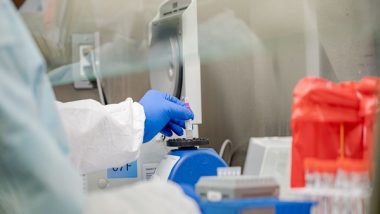New Delhi, May 19: Amid the surge in COVID-19 infections, Delhi is also "frequently reporting" cases of black fungus, also known as mucormycosis, sources said on Wednesday. According to sources, so far more than 130 cases of the fungal infection caused by the steroid administered in the treatment of COVID-19 infection have been reported in the national capital.
"Around 75-80 cases have been reported at All India Institute of Medical Sciences (AIIMS), around 50 cases in Max hospitals, and 10 cases in Indraprastha Apollo hospitals," they said. On Tuesday, sources had informed ANI that AIIMS is developing guidelines to treat black fungus. Mucormycosis Scare in India: What Causes Mucormycosis and What Are Its Symptoms? How It Is Related With COVID-19? All You Need To Know About Black Fungus.
Till now, cases of black fungus have been reported in various parts of the country including Karnataka, Uttarakhand, Telangana, Madhya Pradesh, Andhra Pradesh, Haryana and Bihar.
As per the Union Health Ministry, people catch mucormycosis by coming in contact with the fungal spores in the environment. It can also develop on the skin after the fungus enters the skin through a cut, scrape, burn, or other types of skin trauma. According to the ministry, the disease is being detected among patients who are recovering or have recovered from COVID-19.
"Moreover, anyone who is diabetic and whose immune system is not functioning well needs to be on the guard against this. The disease is caused by a set of micro-organisms known as mucormycetes, which are present naturally in the environment, seen mostly in soil and in decaying organic matter like leaves, compost and piles," the Ministry said.
It stated that the treatment of COVID-19 patients involves the intake of drugs like dexamethasone, which suppresses our immune system response. Due to these factors, COVID-19 patients face a renewed risk of failing the battle against attacks mounted by organisms such as mucormycetes.
(This is an unedited and auto-generated story from Syndicated News feed, LatestLY Staff may not have modified or edited the content body)













 Quickly
Quickly




















